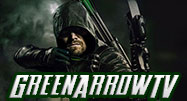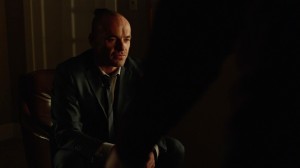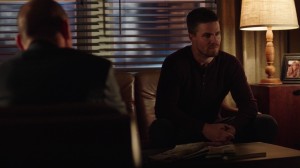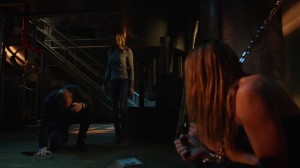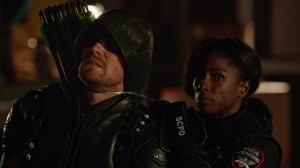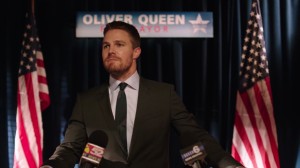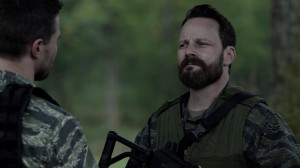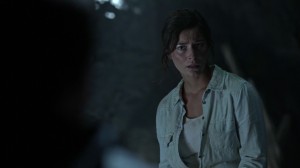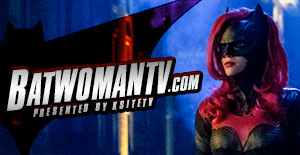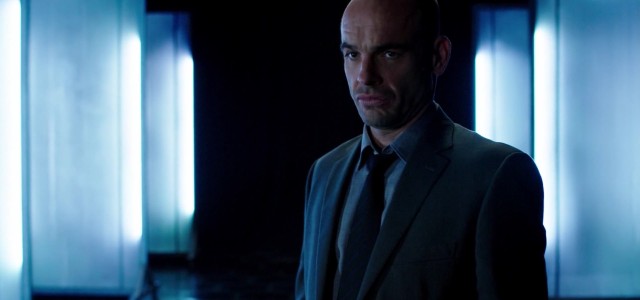
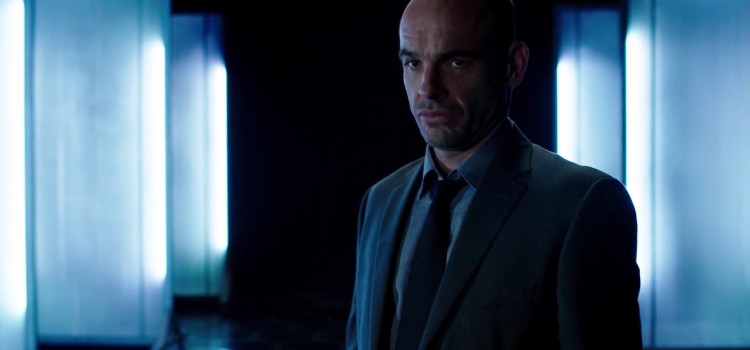
Arrow #4.4: “Beyond Redemption” Deep Review
Recaps & Reviews November 3, 2015 Matt Tucker

Summary: A showcase for Blackthorne and Quentin Lance that tears him apart in many ways but rebuilds him with purpose.
If you have not seen this episode yet and do not wish to be spoiled, do not continue reading!
For a full episode synopsis, grab a read of our Quickshot Recap: #4.4: “Beyond Redemption”
Review
The unfortunate aspect of working on a network with a primary focus on younger demographics, if you’re an older actor, is that your playing time is often short and inconsistent as they feature the actors closer in age to their demo targets. Older actors are usually relegated to playing parents of the younger cast, and while they get thrown some bones on plotlines now and then, there are usually good chunks of time to go off and find other work to keep one busy. That’s not in any way to slight the network. Just an observation of the reality.
Occasionally, you get some exceptions. Of note, The Flash‘s use of both Jesse L. Martin’s Joe West and Tom Cavanagh’s Dr. Harrison Wells is essential to the make-up of that series. In the case of Arrow, aside from John Barrowman’s Malcolm Merlyn by virtue of being a primary antagonist, the show has made efforts to trim its “parental” cast since it debuted. But then, there’s Paul Blackthorne. Yes, he fills the parental role for Laurel and Sara, but he’s also the face of the cops in Star City. (Though, the show seems to confuse his role as a single precinct captain with that of the Chief of Police from time to time.) Given the nature of Team Arrow’s work, a direct point of contact for the relationship between the heroes and law enforcement is both valid and imperative. That role, particularly the personal connection between Quentin Lance and Oliver, buys Blackthorne more screen time, and the show is the better for it.
For the most part, the series does fairly right by Blackthorne. The nature of his role doesn’t require that he appear in every episode, and more often than not, when they use Quentin they use him well. Still, last year, Quentin and Blackthorne both felt underserved, even with such a critical storyline as the effects of Sara’s death on those closest to her life, and the strain that Laurel’s keeping it from him put on their relationship. It wasn’t until Ra’s al Ghul revealed Oliver’s secret to him and his grief-fueled campaign to take down the hooded vigilante returned that he offered a fair amount of significance to the season’s story. Thankfully, in one of the good number of course corrections for the show this year, Quentin is proving essential to the main through-arc, and Blackthorne gets to shine. None more brightly (so far) than this showcase episode for him.
Like a Kick to the Guts
While The Flash has traded in the concept of father figures for Barry Allen’s story, Oliver Queen’s has been decidedly about the absence and specter of his father. The other males in his life have tended to fall into more brotherly roles, as well as serving as mentors. Oliver is even quick to dismiss and reject Malcolm’s unnerving desire to consider Oliver the son he never had in Tommy. Yet, then there’s always been Quentin Lance. Oliver was introduced to him, as many of us are to those of our parents’ age, by being a classmate of Laurel. When Oliver and Laurel started dating, that desire to please and be viewed worthy in Quentin’s eyes took root, particularly because Quentin was so dismissive of him. Being a cop and then a homicide detective only compounded the issue, and it didn’t help matters when Oliver’s teenage rebellion took form in the partying rich playboy veneer. Like many teens and young adults, Oliver kept on his path of self-destructive behavior, despite that strong desire to want to prove himself to Quentin. Of course, that led to disastrous results, which unfortunately soured their relationship even further once Quentin believed Oliver had gotten his daughter killed.
That made the reveal that Oliver was the Arrow last year even more of a cut to Quentin. He’d already had his issues with the vigilante, something at his core as a cop he couldn’t abide but begrudgingly turned to given the escalation nature of the threats to their city. He’d actually come to both appreciate and respect his hooded secret weapon, but learning it was Oliver the whole time was crushing. Crushing not only because the lifestyle of the Arrow and his companions help contribute to the recent death of Sara, but because it was Oliver Queen who took his baby from him in the first place, setting her off on this dangerous path. It was that truth, something Oliver truly feels some guilt over, that really fired his aggressive push to take down the Arrow last season and certainly has made him both prickly and distrustful of Oliver this year. Yet, his daughter Laurel’s involvement in Team Arrow keeps him tethered and his desperation as a police captain continues to force him to rely on the group even if he hates the idea of what they are doing.
It’s that desperation that led Quentin to make his devil’s deal with Damien Darhk. Three terror attacks on the city in as many years have left them without a dedicated leader and citizens fleeing in droves. With a limited police force and even more limited resources to serve and protect those that are staying, Darhk presented Quentin with an opportunity to do some good to turn things around. While the moment Darhk walks into the city leadership meeting in the season premiere set the idea that it was Quentin’s first time being introduced to him, it turns out Darhk came to him directly earlier as a concerned citizen with the resources to help the city. Upon that handshake, though, the deal has gotten progressively worse for Quentin and the city, and now Darhk threatens Laurel’s life as a means of keeping the captain’s fealty. That adds some extra zip to Quentin’s bite towards Oliver upon his return to the city; once again he’s turned to a force outside the law and it’s failed him and compromised his own sense of righteousness.
It’s that righteousness that Oliver has admired since returning to Starling/Star City and part of why he’s continually looked to try to work with the police in his efforts, especially as they moved away from vengeance. So, how truly devastating it must’ve been to him to see Quentin talking with Darhk. It’s akin to that scene of the Battle of Falkirk in Braveheart [*spoilers* for anyone who has never seen the movie but might want to watch it] where a wounded and bleeding William Wallace musters his strength to race down the masked commander on the field and pulls the helmet off only to reveal his supposed friend and ally, Robert the Bruce, has betrayed him to the English and supported war against their fellow Scots. The cut was deeper than any wound he’d experienced on the battlefield, as if his very soul and reason for living had been cleaved by a mighty claymore blade.[end spoilers] There’s nothing as truly gutting as seeing someone break the covenant of your faith, whether it’s a bonafide spoken pact or a tacit understanding by being a hero and an example.
What’s really great about the way they play this is the reveal of the camera footage that caught the Lance-Darhk conversation, which coincidentally was a desperate Quentin trying to figure out what to do about the resurrected Sara, happened right at the act break. Oliver sees it and coldly identifies what’s going on, but we don’t see much of a reaction from him. Come back from commercial for the next scene and Oliver’s waiting in Quentin’s apartment. We really have no idea how this conversation is going to go, and it’s even better for it.
This truly is one of the best scenes of the series to date, and hats off to writers Wendy Mericle and Speed Weed and director Lexi Alexander (Green Street Hooligans, Punisher: War Zone) for pointed dialogue and clean, simple direction to just let the words and the communication live on its own. Really, though, it’s Stephen Amell and Blackthorne who are the rightful stars here and both get to bear teeth and wade in pools of disappointment and regret. The anger and pushback are both visceral and ever present, but there are a surprising number of layers within these 2-1/2 minutes that really plays at just how broken Oliver’s spirit is and just how lost Quentin is at the moment. Even better, nothing is resolved in the scene. No demands, no ultimatums, no handshakes or declarations. It’s two humans have a powerful moment and unsure of what happens next.
That unsurety even tempts Oliver, however brief, to consider putting an arrow through Quentin later when Liza Warner has him tied up. Maybe not to kill, but perhaps to give a nice permanent scar.
Family Valued
As if his life couldn’t get more complicated, Quentin is brought face to face with what one can only assume would be a nightmare for most parents. Yes, any parent would want their dead child back, but faced with it in reality and seeing how much of a feral shell Sara is of herself currently, that would have to hurt the heart in ways unimaginable. Laurel is trying to do right by her father by letting him in on her secret immediately, but presenting your reanimated sister like a science fair project is all kinds of morbid. Her intentions are in all the right places but her judgment certainly doesn’t seem to be. And while there are moments when Quentin is positively elated to lay eyes on his youngest once more, his fear is overwhelming.
Rightly so, as Sara doesn’t presently exist in her body. Unlike Thea, who was still alive and still possessed her soul, her lifeforce, her personality, Sara was gone. Her corpse had none of those things, and instilled with life, it was also instilled with the traces of lifeforces of others that have used the Lazarus Pit over untold numbers of years. Quentin turns to Damien Darhk because of his past with the League and knowledge of such oddities of their world. When something even creeps out Darhk, it’s worth paying heed. Execute the beast is Darhk’s advice, as it is no longer Quentin’s daughter. Yet, how can he? He’s lost her twice, and now being faced with having to off this thing in her form by his own hand, regardless of Laurel’s intervention, is a vicious kind of torture. Blackthorne captures the tumult very well, and it’s heartbreaking to see a grieving father put through that.
This is what Laurel’s blind optimism misses with both her dad and with Nyssa. All had to deal with their processes of letting Sara go, and in ways it’s supremely unfair of her to revisit that upon them. Yes, she’s not trying to hurt anyone and merely wants her sister back. With the means available, she jumped at the chance. Sadly, knowing that Sara Lance (and Caity Lotz) is going to be one of the star characters on Legends of Tomorrow undercuts a lot of the mystery about this particularly plotline, leaving it more a how-to of getting her back rather than a journey. And once Sara’s soul is reunited with her body, it’s going to give Laurel a pass for her decision, as if it were thoroughly justified. But as the old adage holds, just because you can do a thing doesn’t hold that you should do that thing. It’s great for us, as the audience, to get Sara and Caity back, but narratively in the show, it’s a decided grey area.
What’s more disturbing is Laurel seems a bit unhinged from reality through this. (But only this as she seems absolutely present in everything else.) I’m reminded of a hurt bird I picked off of the ground when I was very young and brought home to nurse back to health. The bird died on the way home, I believe, but my blind optimism was that I could help him to recover and fly again. Needless to say, my mom wasn’t thrilled when she discovered the bird in my room, not least of which because I hadn’t considered any consequences for bringing a dead bird into the house, such as possible disease. Rationality goes out the window in that misguided hope, even when you are face to face with it or it’s choking you with the chain you’re using to hold it to the wall. (That doesn’t even touch on the fact that this is in the communal basement of her apartment building where conceivably anyone could have access and find a young woman shackled against her will.)
It’s understandable that Laurel is blinded by the possibility of having Sara back. Yet, whether it’s directing or an acting choice, there’s a sort of Stepford Wife-like vibe when it comes to her interaction with and about Sara that reads as creepy.
Bad Cops, Bad Cops, Whatcha Gonna Do?
A highlight episode for Quentin also turns attention on the cops, both to help set the scene for the police force in the city and really drive home the idea that hope needs to return for a sense of justice to be filled. Liza Warner, known by the oh-so-witty moniker Lady Cop in the comics, was a star of the Starling City PD. She was so good that Quentin recruited her as his sergeant to lead the anti-vigilante task force that he reassembled last year to take Oliver down. In fact, in the comics, Lady Cop was so good at her job and rose above corruption that she eventually became the chief of police in Ivy Town, home of Ray Palmer and the Atom. Here, though, she commands her crew by way of a proverb: Desperate times call for desperate measures.
Prior to finding out about Quentin and Darhk, Team Arrow tracks some evidence that Quentin provided Oliver to a hidden cache of advanced weapons that belonged to the SCPD. This was disheartening for Oliver because now they were having to deal with bad on both sides of the law, but was particularly despoiling to Quentin because he looks at his cops as a sacred family. The idea that cops would kill some of their own, as Warner’s corner was forced to do with the narcotics detectives that showed up on one of their raids, would obliterate the wind from anyone’s sails. When Team Arrow’s drug deal trap reveals to Quentin that this was his hand-picked task force, it’s even more wrenching. Disappointment abounds for Captain Lance this episode, and yet his earlier confrontation with Oliver lets him reconnect with a core part of himself to offer rationale and clarity to Warner during the contraband disposal facility raid.
He explains how nothing can justify their actions but that the loss of a sense of hope and justice is what veered them off course. That hope has to begin within, and that the only way justice can prevail is by sticking to the ideals that drew them to the police force in the first place. It’s when the hold fast, even in the lean times, that those ideals matter most and will eventually win out and return things to glory. It’s a bit of a grandiose speech and really hopes to play on the sense of self rather than the practical realities that drove Warner and her men to do what they’ve done. Yet, it works, and it also enlightens Oliver on Quentin as a man and their next steps forward.
Warner and her mostly faceless crew serve as this week’s one-off “villains.” It’s mostly a perfunctory job but stands out more because it puts a face to the struggle that Oliver wants to step into as mayor.
Queen for Mayor
I’ll admit to being a bit torn over the decision to have Oliver enter the mayoral race. There was an aspect of it that felt like just finding a task to give Oliver something to do, and a task for just Oliver completely unrelated to either the Green Arrow or his relationship with Felicity. Yet, Oliver’s reaction to his discovery of the relationship between Quentin and Damien Darhk, that he genuinely felt the city he wanted to save was gone and there would be no point in running for mayor, caused a re-examination of Oliver’s sense of being and purpose through these first four episodes. He ran off with Felicity at the end of last season because he thought that’s what he needed to do to find himself as a person. After their travels and settling down into suburban life in Ivy Town, he was relegated mostly to keeping up connections with the neighbors and learning to cook. While he’d kind of anesthetized himself to it, there really wasn’t a strong sense of purpose to his life. Even coming back to Star City and assuming the mantle of Green Arrow to continue the quest he thought he no longer needed, there was still something that wasn’t quite driving his heart.
It was when he had the conversation with Jessica Danforth about why Star City needs a mayor with vision and direction perhaps more than it needs Green Arrow or any other heroes that his heart hit upon that sense of purpose. In having his spirit crushed by what he felt was betrayal by Quentin, it solidified that running for mayor isn’t just something for him to do. It truly is a calling to help guide the city in ways he’d never be able to do as a masked hero. How those two pursuits in his life help or hinder each other remains to be seen, but it’s nice to see further growth as a human being in Oliver that has very little to do with the Arrow’s journey.
We took a lot of issue with the Season 2 storyline of Moira running for mayor. In truth, she’s the kind of person who would run for office. It just wasn’t believable that she would have a legitimate chance with an electorate who most recently knew her as a jailed accomplice of Malcolm Merlyn, the orchestrator of the attack on the Glades. Yes, she was acquitted but voters don’t tend to forget, especially in this day and age of judgment via social media. Moira, though, was much more traditionally qualified for the position than her son, so it’ll be interesting to see how Oliver fares in the race. Though, by all rights, he should be running unopposed, as the city leaders couldn’t find anyone willing to put their hat in the ring for mayor. Just by showing up, he might have the job.
Still, it will be intriguing to see how he negotiates his public image with his intentions for the job. America likes underdog stories, even if they are ex-wealthy, entitled playboys in the public’s eye. His ordeal for being lost for 5 years would no doubt play to the crowd, but the insistence on briefly playing up the drunken lout as a public persona when first starting out as the vigilante might bite him. Not to mention his ineffectiveness at keeping his family’s company from Ray Palmer buying it out. In the political world, Oliver Jonas Queen has an image problem. How does that serve him if and should he be elected and serve as mayor?
Can You Hear Me Now?
Speaking of Ray, Curtis finds out that the wackiness with Felicity’s phone, which she’s begun to assume is a prank by Curtis because it only happens in the lab, is caused by an encrypted message left by Ray seemingly prior to his death. The message is password protected and, tech that he is, Curtis determines that it must be a password Felicity would know. Of course, she wants nothing to do with a message from Ray, particularly his final message. Curtis is understandably baffled as to why she won’t help and she finally has to, reveal that they had an intimate relationship and she doesn’t want to hear the final words of someone she dated. This brings up a curious point that, apparently, no one in the company knew Ray and Felicity were an item for a brief time. That, at least, serves as a clean method regarding the transfer of ownership of the company. Seemingly, no one could accuse her of having slept her way into being handed the keys. Which is good because that would be a unnecessary distraction and preserves the integrity of both Ray and Felicity, let alone not being anywhere in the vicinity of being true.
Curtis is having none of it, though. He recounts a touching story of how he lost his brother to cancer and would do anything to hear even a single new word from him again. That the idea floats amongst the context of what’s going on with Sara is humorous and not lost. Still, he’s absolutely right and Felicity finally relents. Rather than being a new message from Ray from micro-land, it does sound like something Ray was recording prior to his accident. Yet, what’s so insistently been pushing it to her phone? And when she hears the full message, will it offer some kind of clue that keys her on Ray’s predicament? Ray might not be able to currently communicate a vocal message, but it would appear he’s using what he had in the past to hopefully tip her off.
Past Prologue
Haven’t touched much on the flashbacks the last couple of episodes. Not because nothing is going on or it’s not interesting. There is a bit of a slow burn to the past events again, but they still feel much more directed than last year. The point of these flashes the last three hours (the season premiere was all about getting Oliver on a plane and back to Lian Yu) has been to established character. Aside from Oliver getting his bearings back on the island, we’ve got the slave woman who appears to hold some kind of authority role amongst the captive workers, and we’ve got Conklin, the lieutenant in charge of the guards overseeing the works. Beyond them, the threat and import of Reiter, head of this operation on the island, looms.
With a lot less time to work with in the past than in the present, they’ve needed to establish the woman’s initial distrust of Oliver, followed by his convincing her that he’s there to help. They’ve also needed to boldly define the threat of Conklin. Guest actor Ryan Robbins — who coincidentally played a man on an island torturing a castaway Lex Luthor on Smallville — gives him the appropriate menace as well as his lack of care for the workers as human beings. Beyond that, though, they really work to play up the idea that Oliver has made the switched to broken, hardened killer. Conklin can see it in his eyes, and earlier Oliver didn’t hesitate to demonstrate his ability to torture as a means to prevent the soldiers from killing one of the workers.
There is an innate care in Oliver that still has yet to be stripped from him. Even with his significantly repressed humanity when he first returns to Starling and begins life as the Arrow, he never really loses that aspect of himself. He was sent here on a mission for Amanda Waller, but he knows deep down that he has to help these people. It’s rewarding that they revisit both Oliver’s old cave and the ability to mimic death, as Oliver convinces Conklin that he killed the woman after she escaped and one of the other guards said sayonara due to a landmine. Yet, if there’s one thing that is consistent about Oliver in the past, it’s that things rarely go the way he plans.
Conklin stumbles upon Oliver’s camouflaged bag and finds the A.R.G.U.S. satellite communication device. Why this thing isn’t encryption is beyond me. Even worse, it’s still displaying Oliver’s previous message session, thoroughly spoiling Oliver’s infiltration of the operation. It’s a ham-fisted means to rat out Oliver’s intentions, but if it kickstarts the action in the past, that might be a forgivable transgression.
One notable thing to keep an eye on: Liza Warner mentions the drug SLAM in the things she lists off are destroyed at the contraband disposal facility in the present. We have our first direct connection between the two timelines’ stories.
Conclusion
While Oliver no doubt gets some boosts to his core character this week, rebounding after some harsh kicks, this is an hour primarily to showcase our dear Captain Quentin Lance and his portrayer Paul Blackthorne. By including him as a key component in the major story arc for the season, he not only feels brought back into the fold but given much more chance to shine. And shine he does this hour, running the gamut of emotions, being ripped bare to his essentials and finding purpose and direction again. This is mirrored in Oliver’s journey and that Blackthorne and Amell got to share one of the strongest scenes the series has ever produced was fitting for both on this path. That Lance is now infiltrating Darhk’s organization opens up story possibility, and we certainly welcome the chance to see Blackthorne continue to strut his stuff.
Odds & Ends
• That the team is using not just Sebastian Blood’s old campaign office but his former lair as their new bunker is convenient, from a production standpoint, but also somehow fitting. It’s a reclamation in a sense. Though, there is a slight bit of creep to it, too.
• It’s kind of nice that Oliver let Thea in on his plan to propose to Felicity at some point but not anyone else. Good bit of sibling connection there, even if she almost blew the surprise.
• Curtis’ Neal Adams reference was a fun nod for the comic book fans. Adams is a well known comic artist, famous not only for his work on Batman but on one of the signature runs of Green Arrow in the comics when Oliver ran with Hal Jordan in the seminal Green Lantern/Green Arrow books of the ’70s.
• Quentin’s joke about not getting a codename during the staged drug deal was funny and a better nod toward it than Felicity’s a couple of episodes ago. Of course, Oliver deems him “Detective.”
• Felicity should probably get a codename, too, if only because the team communicates with her out in the open. Her forebears Barbara Gordon and Chloe Sullivan were Oracle and Watchtower, respectively. She doesn’t need a costume, but some kind of tactical name would be nice and prudent. May we at GATV suggest, Mr. Marc Guggenheim, the name Overwatch? We think it’s one you might be familiar with and like.
• Really enjoy how Oliver just parades Quentin into the new lair, and Quentin is far from concerned about busting any of them. Have a feeling this is going to be a much better and more fruitful partnership than the last time.
• Black Canary’s line about “same cry, different frequency” was an odd, and probably unnecessary, bit of exposition that felt a bit too close to the infamous “toad in lightning” from Storm in the first X-Men movie.
